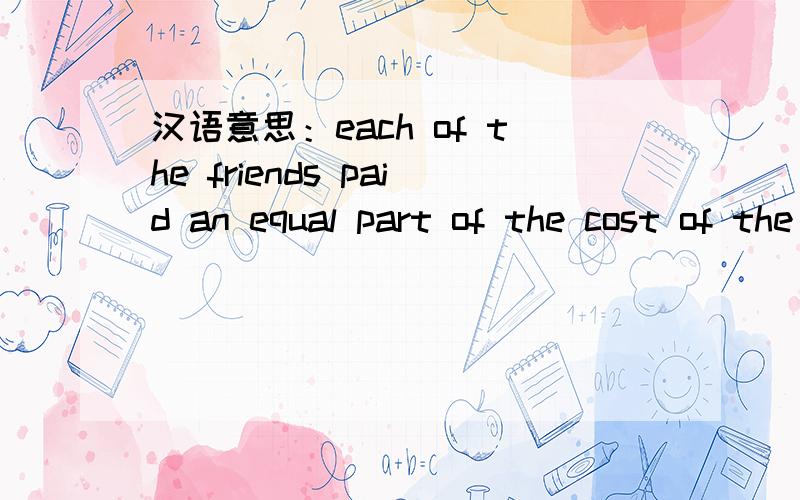汉语意思:each of the friends paid an equal part of the cost of the dinner,which was $96为何是一共96$而不是每人96$呢?
来源:学生作业帮助网 编辑:作业帮 时间:2024/11/20 08:49:18

x�͑�j�@�_%
��;A�1�N5�P�M,n/��K�P�iR�EZ��J�j��.vf̬|�
/)v!�)4�!s����� >�ձz4�Qd���(�c\"ʥb"��Q���p�ĉ��9���N(?���$��7
�!-(�'�#�ni��#D�`��2
U�B-
�6TH�}���u�Q8ڎ?��U4P�R�D����3o�֜uzK=�X�3
{�k��*�g}��46�D�PCe�h ^`�k�H_��VO�D�����_�:��>�m���5ñ��ef�e��<����+IA
��7��y�g���@����5���e7��mA떂'
R��Bj�eO��5�p
�}��֝M���%p
@,��[ ��}�2��}�3��Pf�
��̽
汉语意思:each of the friends paid an equal part of the cost of the dinner,which was $96为何是一共96$而不是每人96$呢?
汉语意思:each of the friends paid an equal part of the cost of the dinner,which was $96
为何是一共96$而不是每人96$呢?
汉语意思:each of the friends paid an equal part of the cost of the dinner,which was $96为何是一共96$而不是每人96$呢?
每个朋友平分这顿饭的话费,每人96美元.因为which前有逗号,是非限定性定语从句.所以定语从句不是修饰dinner的,是说前面那句话的.
每一位朋友均摊了这顿饭的钱,一共96
每次的朋友付出了同等成本的一部分的晚宴,这是96元 “Which was”
每一位朋友均摊这顿饭的钱,一共96元。
each汉语意思
汉语意思:each of the friends paid an equal part of the cost of the dinner,which was $96为何是一共96$而不是每人96$呢?
the flame of our love 汉语意思
the passage of days 的汉语意思
Fall of the Pagoda的汉语意思
the price of的汉语意思
Fall of the Pagoda的汉语意思
children of the world的汉语意思
the name of的汉语意思.
the name of的汉语意思,
mon-fri什么意思
each of 意思
It gave the clothing sizes of each family member如何翻译成汉语?Thank you.
It's the end of the working week .汉语意思
each boy each of us each of the boys
Fri,
The door closed of itself的汉语意思是什么
It is east of the cinema.汉语意思